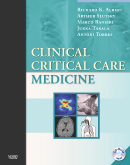Comprehensive and clinically oriented, this new text helps you
provide the highest standard of care for patients in the ICU뾦n one
full-color volume. An international cast of experts offers in-depth,
authoritative guidance on clinical problems from a multitude of
perspectives. Inside, you'll find a user-friendly format with a
consistent organization from chapter to chapter for easy reference,
and a bonus CD-ROM containing all of the illustrations from the text
for use in PowerPoint slide presentations.
Key Features
Offers you the insights and benefits of critical care research being
performed outside the U.S.
Combines practical, clinical guidance with the basic science
necessary to effectively treat and manage critical care patients.
Emphasizes the practice of critical care, including general organ
system monitoring and support.
Covers the wide range of diseases, disorders, and trauma encountered
in the ICU.
Discusses everything from biologic response to stress to mechanical
ventilation to problems associated with infectious diseases.
Includes detailed discussions on the hottest topics in the field,
including mechanical ventilation * assessment for weaning * pregnancy-
related critical care * and bioterrorism and unusual critical care
medicine conditions.
Uses over 600 full-color illustrations that explain every detail.
Offers a differential diagnosis table, a management algorithm, a
therapeutic implications flowchart, and a controversies box in every
clinical disorders chapter.
Includes a BONUS CD-ROM that lets you download all of the superb full-
color illustrations from the book into PowerPoint.
Related Titles
Sleep Medicine Clinics
Table Of Contents
View Table of Contents
Author Information
By Richard K. Albert, Professor of Medicine, University of Colorado,
Chief, Medical Service, Denver Health Medical Center, Denver, CO,
USA; Arthur Slutsky; V. Marco Ranieri; Antoni Torres; and Jukka Takala
Clinical Critical Care Medicine
Albert, Slutsky, Ranieri, Torres & Takala
Table of Contents
Section 1. Basic Biology and Critical Care Medicine
Inflammation * Genetics * Biologic Response to Stress * Vascular Tone
* Cell Metabolism and Tissue Hypoxy
Section 2. Practice of Critical Care
ICU Pharmacology, Including Sedation, Paralysis, Analgesis, Delirium
* Antibiotics in the ICU * ID Prophylaxis * Prophylactic Therapy *
ICU Scoring Systems * Hemodynamic Monitoring
Mechanical Ventilation
Modes * Tracheostomy * Monitoring * Patient뻱entilation Interaction
* VALI * Assessment for Weaning * VA Pneumonia * Clinical Assessment
of the Acutely Unstable Patient * Nursing Issues of the Critically
Ill * Nutritional Support * Withdrawal and Withholding Life Support
Section 3. Pulmonary Problems
Acute Exacerbations of COPD and Asthma (including VCD) * Acute
Respiratory Distress Syndrome, Including Near-Drowning, Vasculitis *
Pulmonary Embolism * Obesity and Chest Wall Problems * Neuromuscular
Respiratory Failure, Including Botulism, Guillian-Barre, Tick
Paralysis, Myasthenis Gravis, Organophosphates
Section 4. Cardiovascular Problems
Pathophysiology of Cardiovascular Failure * Cardica
Ischemia/Infarction * Arrhythmias (brady, tachy, pacing) *
Hypertensive Emergencies * Acute Cardiovascular Emergencies * Heart?
Lung Interactions
Section 5. Neurologic Problems
Intracranial Pressure and Central Brain Flow Regulation * Management
of Traumatic Brain Injury, Including Secondary Insult, Traumatic
Edema (Glasgow Coma Scale) * Management of Subarachnoid Hemmorhage,
Including HHH, Vasospasm * CNS Infection and Vasculitis * Seizure *
Management of Spinal Injury * Brain Death and Management of Donor
Section 6. Renal and Metabolic Problems
Acid Base Disorders * Electrolyte Disorders * Acute Renal Failure *
Hepatorenal Syndrome * Acute Endocrine Disorders * DKA and HONC
Section 7. Gastrointestinal Problems
GI Bl


